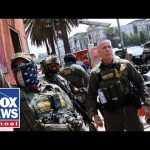In what can only be described as a tragic and alarming situation, recent news has highlighted a troubling event involving a shooter and the weapons he was able to acquire. As investigators piece together the puzzle, former FBI investigator Bill Daley and retired FBI Joint Terrorism Task Force supervisor Jack are shedding light on the concerning questions surrounding this case.
One of the biggest mysteries at the moment is how the shooter managed to get his hands on his arsenal of weapons. These individuals, noted for their extensive experience in law enforcement, are particularly interested in discovering whether there were any clues, often referred to as “leakage,” that could have hinted at the shooter’s intentions or unstable mental state prior to the shocking incident. This idea raises serious questions about accountability not just for the shooter but also for those who may have been aware of his deteriorating mental health and potentially enabled his behavior.
As the public awaits a press conference from the police chief, it becomes increasingly clear that understanding the shooter’s background is critical. Investigators believe that there may have been signs leading up to this event, whether they were warning signals or disturbing behaviors. The notion that people in his circle could have seen these signs is a daunting thought. If there were indeed friends or acquaintances who knew about his issues, one may wonder if they could have taken steps to prevent this tragedy.
Further complicating matters is the discovery of a manifesto left behind by the shooter, detailing his unsettling thoughts and motivations. While the specifics of the manifesto remain undisclosed, the existence of such a document indicates that this was not a spontaneous act but rather a carefully plotted scheme. Bill Daley emphasizes that the shooter must have been planning this for quite some time, giving rise to the question of who, if anyone, assisted him in acquiring these weapons legally. This complicity, whether direct or indirect, could lead to further investigations into those around him.
As the conversation unfolds, it becomes evident that the issue of gun violence isn’t just about the act itself but also about the broader social implications. It provokes thought about mental health support systems and the need for communities to be vigilant. The ripple effects of such tragedies can be felt far beyond the immediate impact, raising questions about what can be done to prevent similar incidents in the future.
In conclusion, the upcoming press conference promises to provide more clarity on this situation. Public interest is high, as many are anxious to learn about the police chief’s findings and the next steps in the investigation. The focus will likely remain on understanding both the shooter’s motivations and the systems in place that allowed him to perpetuate such a violent act. As the nation grapples with these unsettling circumstances, one thing remains clear: it is a collective responsibility to be aware and proactive in preventing future tragedies.




